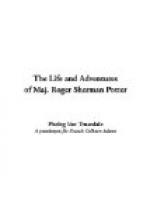I was told, too, that the subject of my lecture had
been warmly debated by the ladies of the Orthodox
Sewing Circle, where Mrs. Silas Heywood, who had written
several strong articles for the Patriot, which journal
adopted them as its own, was heard to declare emphatically
that she had never heard of this man Crabbe, though
she had read no end of books. Miss Bruce had
been six quarters at the high-school, knew something
of Latin and algebra, and had taken music lessons of
Monsieur Pensin; but she had never heard of Crabbe
until she read “Night and Morning,” where,
out of sheer affectation, as it seemed to her, she
found that the author had made sundry quotations from
him to adorn the heads of his chapters. As for
Miss Leland, who had been two years abroad with her
father and mother, and was supposed to know all about
literature and the poets, she thought Mr. Crabbe could
not be much, since she had not even heard of him while
in England. Mr. Faulkner, the storekeeper, had
not a book of Crabbe on his shelves, though he dealt
largely in hardware and literature, and was a very
respectable scholar. And Squire Brigham, the lawyer,
who mixed himself up with other people’s business
a great deal, busied himself in saying: Crabbe
must have been an obscure fellow, for though there
was a pyramid of old books in his library, he had not
one of this author’s among them; and perhaps
he ought to be thankful for it, for indeed Mrs. Forbush
had said to him in confidence, that she understood
of the little deformed man that Crabbe had written
some very bad things of lawyers. Mrs. Forbush
went regularly to Boston to get the fashions and attend
the Lowell lectures; Mrs. Forbush had written a religious
novel for the “Olive Branch;” Mrs. Forbush
said, who would have thought of giving such a looking
little creature five dollars and his victuals for
lecturing upon such a subject
The cry of fire without, and the loud peals of an
alarm bell, suddenly threw the town and the tavern
into a state of great excitement. Giles Sheridan
stopped short in his discourse, and the inmates of
the house rushed in great agitation into the street.
The alarm spread rapidly, and people began to run
in every direction but the right one. One declared
it a false alarm. That it was set on foot to
afford recreation for the mischievous, another was
quite sure. A third was ready to swear he saw
the incendiary run down “the lane.”
People ran in opposite directions, crying fire.
People, wayward and confused, were endeavoring to
persuade one another that the scene of the fire was
not in the direction they were going, though neither
smoke nor flame could be seen in any part of the town.
And while the people were thus confused, an harsh and
grating voice cried out that the fire was down the
lane, a narrow pathway that led from one part of the
town to another. The confused figures of men
who had stood contemplating here and there about the
square, now rushed down the lane, and soon came in




